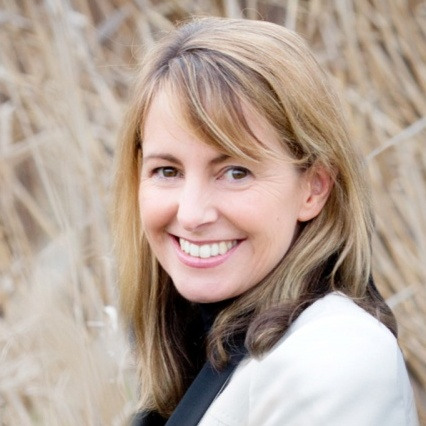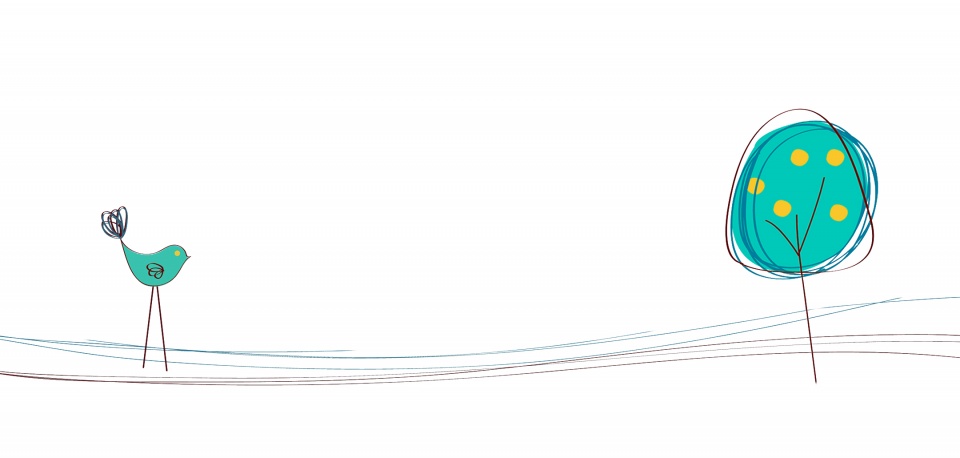
A Guide to Low Carbohydrate Healthy Fat principles
There is sound evidence to suggest that reducing sugars and processed carbohydrates, while reintroducing a healthy balance of naturally occurring saturated and mono-saturated fats back into our diet, will lead to improved health outcomes.
There is no question that our health is directly linked to our nutrition and that the food we eat can be medicine, too.
Our approach is based on Low Carbohydrate and Healthy Fat (LCHF) principles, encouraging people to eat a wide variety of fresh, seasonal and local food, including vegetables and proper amounts of protein; determined by age, activity and their metabolic health.
I believe an LCHF lifestyle is affordable, achievable, and sustainable for those who choose to adopt this way of life.
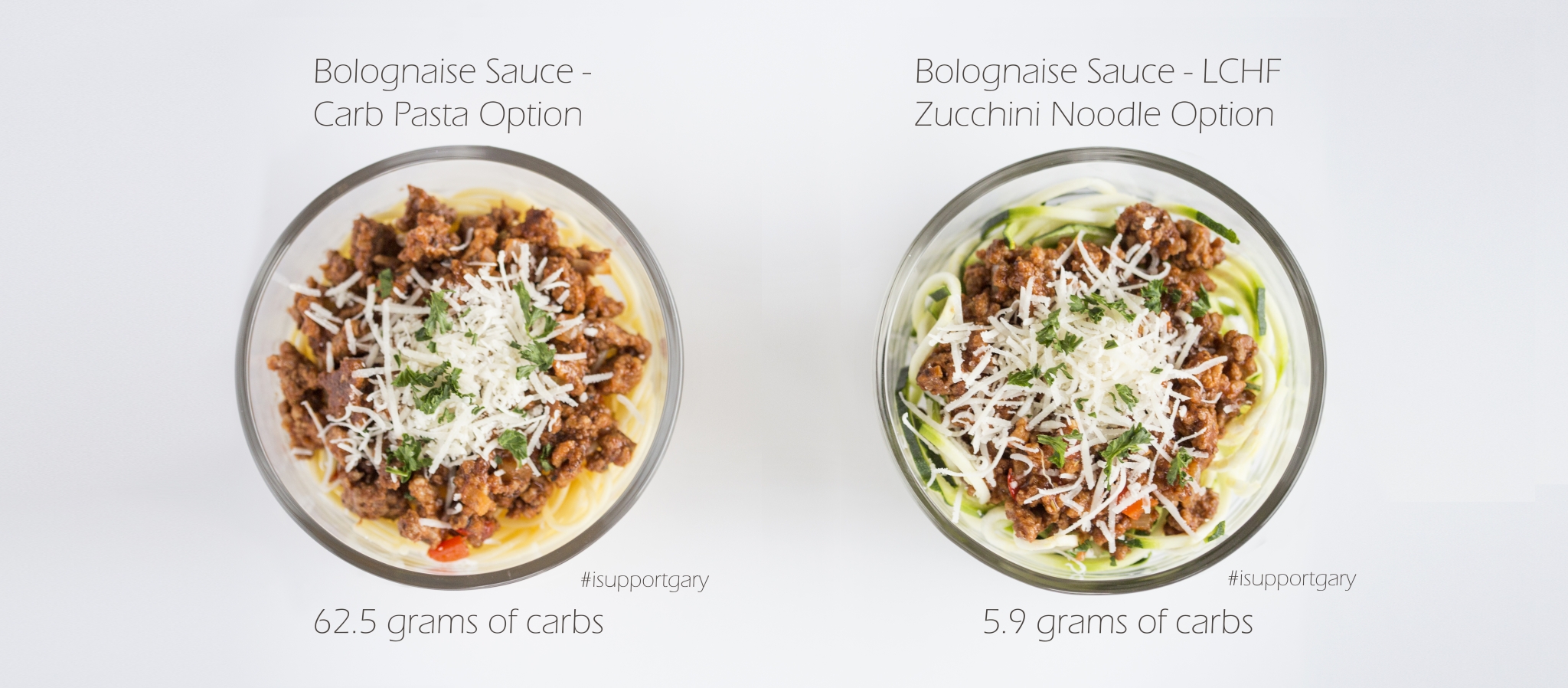
The #isupportgary starter sheet below provides a general introduction to Low Carbohydrate Healthy Fat principles. The information is a guide to help you begin to take back control of your health and is not intended to be considered specific medical advice.
Please take a look at the What to Expect When You Go Low Carb resource page, too. It covers topics around cravings, magnesium, salt and the need to adjust medications. Importantly, reducing carbohydrates will mean less insulin requirement and therefore less insulin production from the pancreas. This reduction will result in increased excretion of salt from the body, along with fluid. Lipid profiles also change when you adopt an LCHF diet producing a significant reduction of small dense LDL particles. These are a by-product of fructose metabolism and are the dangerous-sized LDL's associated with cardiovascular disease.
*If you have diabetes and are on medication or insulin please be aware, and careful, when reducing your carbohydrate intake, as your blood glucose levels will drop. You may go lower than usual and need your medication reviewed. Gary and I strongly recommend that any changes to your diet should be made under medical supervision and in consultation with your General Practitioner and Endocrinologist.
Tips for getting started
Get smart – Make informed choices about what you eat
Be mindful – Eat only when you feel hungry and stop when you are full
Downsize – Eat smaller portions and eat off a smaller plate
Drink more water – We often mistake thirst for hunger
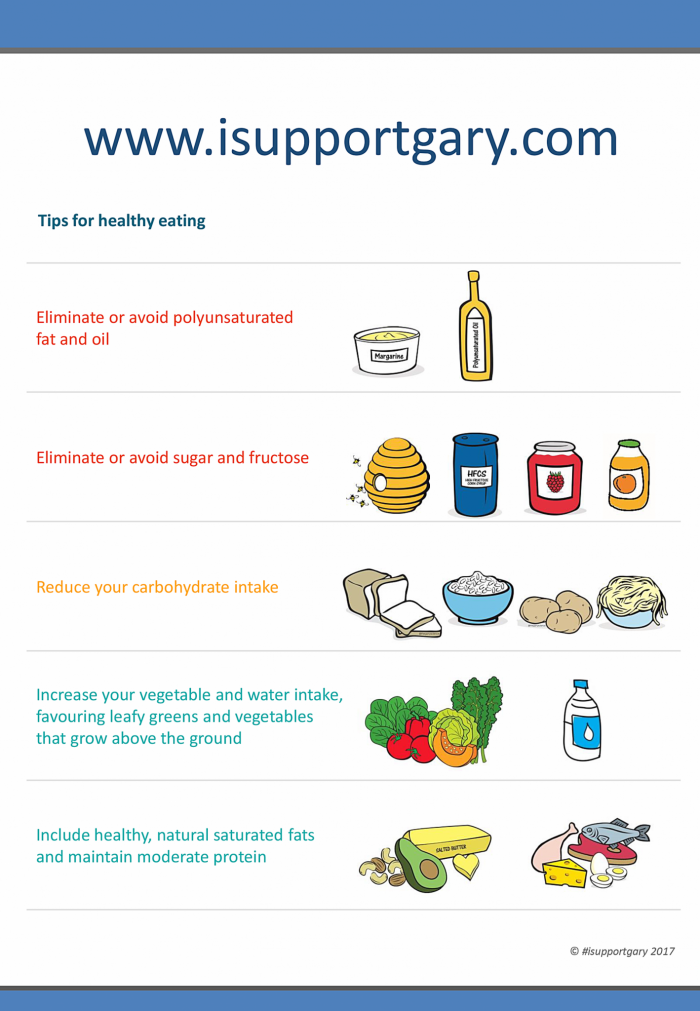
What is food?
Food is made up of a combination of macronutrients, water and micronutrients, including vitamins and minerals. The fuel sources for our body come in one of three forms:
1. Carbohydrate
2. Protein
3. Fat
No natural food source is 100% carbohydrate, protein or fat, they are a combination. Determining which foods should be included in a healthy diet is all about balance.
What is LCHF?
A 'fear of fat' has gripped the western world since the introduction of the traditional food pyramid over 40 years ago and low-fat products have flooded the market.
At #isupportgary we recommend that you replace low-fat products, which are generally laden with sugar, with full-fat alternatives and encourage the inclusion of healthy, naturally occurring fats in your diet.
But how much fat is too much fat and what does a balanced Lower Carbohydrate and Healthy natural Fat (LCHF) diet look like?
Lower Carbohydrate*
We recommend lowering your intake of sugars, processed and refined carbohydrates and enjoying carbohydrates that are derived from fibrous vegetables instead. This includes non-starchy vegetables (asparagus, broccoli, cauliflower and spinach) and high water content vegetables (celery and cucumber).
Healthy Fat*
Gary and I recommend the inclusion of healthy, naturally occurring saturated and mono-saturated fats as part of a balanced diet, in particular for blood glucose control.
Foods high in saturated fat include butter, ghee, organic or grass-fed meat, free-range poultry, fish, game, full-fat dairy products, eggs, and coconut oil.
Nuts and seeds are good in moderation due to their high fat, high fibre and low carbohydrate profile.
Tips for including healthy natural fat in your diet

*Cook with small amounts of butter, lard, coconut oil or ghee instead of polyunsaturated seed oils
*Choose higher fat cuts of quality grass-fed meat
*Enjoy baked chicken and fish with the skin on
*Add avocado as a side to your breakfast
*Drizzle macadamia or olive oil over your salad
*Snack on small amounts of nuts and seeds
Be careful not to over-eat healthy fats when transitioning to LCHF. You still have to consider the caloric intake of healthy fats, especially if you want to lose weight.
How to implement and sustain the change
Continue to check my newsletter and the #isupportgary website for more information about how we can support you to take back control of your health, including:
Broad principal nutrition advice, and guidance, on the types of foods you should be including and avoiding in your diet in order to achieve your health goals.
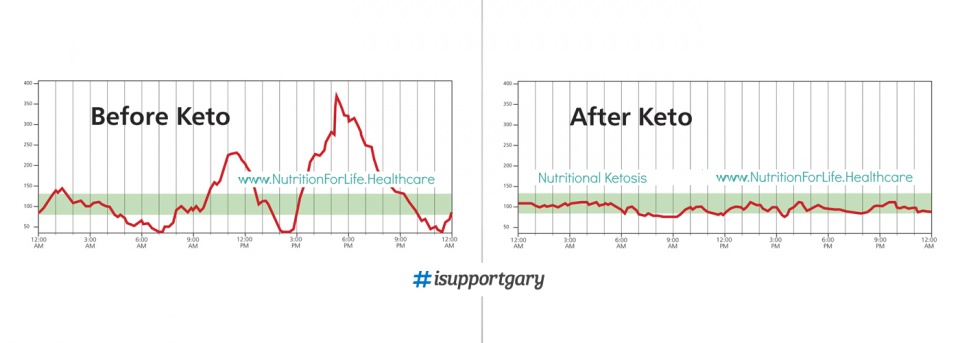
Some resources and websites Gary and I would recommend;
Information on a range of health issues including: -
*General health and weight management
*Therapeutic Carbohydrate Restriction Guidelines
*Recipe Books for everyone, even kids!
Don't forget, carbohydrates are simply glucose ...

